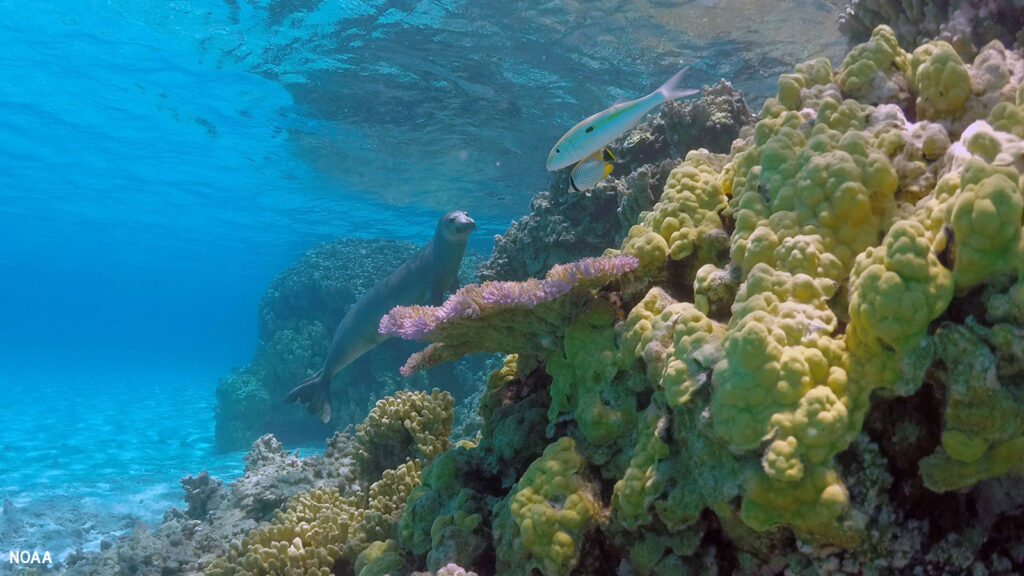
Public comment on Sanctuary draft proposal requested through May 7, 2024
Today, following input from state and federal agencies, local communities and the public, NOAA released for public comment its draft proposal to designate marine portions of Papahānaumokuākea Marine National Monument as a national marine sanctuary. The proposed Papahānaumokuākea National Marine Sanctuary would supplement and complement existing authorities, including the area’s designation as a marine national monument.
Sanctuary designation would provide clarity and comprehensive protections for Papahānaumokuākea’s ecosystems, wildlife and cultural and maritime heritage resources. NOAA and the State of Hawaii would co-manage the proposed sanctuary, complementing the existing management structure for the monument. The monument is currently jointly administered by four Co-Trustees — the Department of Commerce, the Department of the Interior, the State of Hawaii and the Office of Hawaiian Affairs.
“This proposed designation furthers the Biden-Harris Administration’s steadfast commitment to conserving and protecting vital marine ecosystems,” said NOAA Administrator Rick Spinrad, Ph.D. “NOAA looks forward to continuing our work with partners and co-managers to strengthen the conservation of Papahānaumokuākea’s natural, cultural and historic treasures.”
Papahānaumokuākea Marine National Monument, in the Northwestern Hawaiian Islands, is the largest contiguous, fully protected conservation area (582,578 square miles) under the U.S. flag, and one of the largest marine conservation areas in the world. Home to the endangered Hawaiian monk seal, threatened green sea turtles and many species found nowhere else on Earth, the complex and highly productive marine ecosystems of the monument are significant contributors to the biological diversity of the ocean.
Papahānaumokuākea is of great importance to Native Hawaiians, and Hawaiian culture is a foundational element in the management of Papahānaumokuākea. The monument is also home to a variety of post-Western-contact historic resources, such as 19th-century commercial whaling shipwrecks and artifacts and those associated with World War II’s Battle of Midway.
“NOAA has worked for decades with partners to incorporate Native Hawaiian heritage, knowledge and values into co-management of Papahānaumokuākea Marine National Monument,” said NOAA’s National Ocean Service Assistant Administrator Nicole LeBoeuf. “A sanctuary designation would continue to honor spiritual and cultural relationships with this special place.”
A detailed description of the proposed sanctuary, as well as additional information about opportunities to provide public comment, can be found on the website for the proposed Papahānaumokuākea National Marine Sanctuary. The public can submit comments until May 7, 2024, through the Federal eRulemaking Portal. The docket number is NOAA-NOS-2021-0114 and comments will be accepted in both English and ʻōlelo Hawai‘i (Hawaiian language).
In addition, NOAA will host in-person and virtual public comment meetings during which members of the public can offer oral comments. Detailed information on the dates, times and locations for public meetings is available at: https://sanctuaries.noaa.gov/papahanaumokuakea/.
NOAA follows a well-established designation process for national marine sanctuary proposals. After NOAA receives written and oral public comments, it will address and respond to those comments as it determines if final designation of the proposed sanctuary is warranted and which NOAA program and management actions are necessary. NOAA has a goal of a final action on designation in winter of 2024/2025.
For more information on the proposed sanctuary, see the Federal Register notice.
###





NECESSARY EXCELLENT PROPOSAL